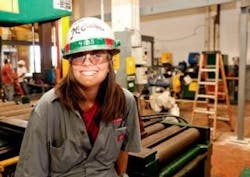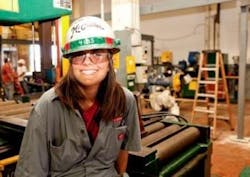Apprenticeship program leads youth to successful and well paid industry careers
The Apprentice School in Newark News, Va. may not look much like other traditional education programs, but thats precisely the point. Instead of accumulating encumbering student debt, students are paid an annual salary of $54,000 by the final year of the four-year program, and upon graduation are guaranteed a job with Huntington Ingalls Industries, the military contractor that owns Newport News Shipbuilding.
“There’s a hunger among young people for good, well-paying jobs that don’t require an expensive four-year degree,” said Sarah Steinberg, vice president for global philanthropy at JPMorgan Chase. “The Apprentice School is the gold standard of what a high-quality apprenticeship program can be.”
Although many still regard them as being for those who aren't quite cut out for college, apprenticeships are being reevaluated by many students and parents seeking an alternative to sharply rising tuition costs.
Hillary Clinton proposed her plan last month to offer companies a $1,500 tax credit for each apprenticeship slot they fill, and Sen. Marco Rubio has recently promised to expand apprenticeships and vocational programs should he become president. Scott Walker even increased funding for apprenticeships in Wisconsin, despite his deep cuts to state's university system.
“We know this works,” said Thomas E. Perez, the labor secretary, describing how big companies have long trained young people in Germany, which has 40 apprentices per 1,000 workers, compared to about three per 1,000 in the United States. “It’s not hard to figure out why the Germans have a youth unemployment rate that is half what it is here.”
Although the Apprentice School model continues to demonstrate that it can provide a virtually free ride for its 800 students, including textbooks and class rings, others have yet to duplicate the program.
Bipartisan support in Congress and several mentions in President Obama's state of the union addresses doesn't mean much when employers aren't willing to participate. With the last recession, manufacturing and construction jobs took a sharp hit, and those industries are still struggling to gain their footing.
The number of active apprentices in the U.S. fell consistently from 2007 to 2013, but recent rises in participation has give Mr. Perez hope that enrollment can double by 2018.
In Mooresville, touring the factory floor and giving a speech at Ameritech Die & Mold, which has teamed with local high schools and a nearby community college to recruit and train its apprentices, Mr. Perez said what was needed was not simply more government financing or new private-sector programs.
“At the educational level, we need a comprehensive strategy to change the hearts and minds of parents,” Mr. Perez told the audience, which included several parents of current Ameritech apprentices. “There are highly selective, four-year colleges that are easier to get into than many apprenticeship programs.”
The Apprentice School gets more than 4,000 applicants for about 230 spots annually, giving it an admission rate about equivalent to that of Harvard.
While the average college graduate in 2014 emerged with a debt of $31,000, Apprentice School students leave campus debt-free and making about $10,000 more per year.
This success is not exclusive to the Apprentice School, however, as Ameritech workers like Shane Harmon, who completed an apprenticeship there in 2012 and earned an associate degree at Central Piedmont Community College as part of the program, are finding that a middle-class life may be more attainable than previously thought.
While many of his friends have been forced to move back in with their parents, Harmon is already a home-owner, debt-free, and being paid $18 an hour.
All of this seems to raise the divisive question of whether college is for everyone, and whether a bachelor's degree should be a requirement for a successful life.
“If you’re in the two-thirds of Americans that don’t have a college degree, how do you feel if someone says to be a success, you have to have it?” said Mike Petters, chief executive of Huntington Ingalls. “It shouldn’t be a requirement for a middle-class life. We have people in our organization who don’t and are great, who’ve raised families and had great lives.”
Despite the dueling rhetoric, many believe it doesn't have to be an either-or proposition, as a new partnership between the Apprentice School and Old Dominion University in nearby Norfolk, Va., allows apprentices to earn a bachelor’s degree in five to eight years, paid for by Huntington Ingalls.
Whatever the case may be, apprenticeships are proving to be a worthy topic of discussion, as they provide an alternative for students seeking a quick and reliable path to a middle-class lifestyle. As Mr. Petters added, "The Apprentice School has been and will forever be the centerpiece of what we do here. I know there’s a red-state view and a blue-state view. This is a shipbuilder’s view.”
About the Author
Aaron Hurd
Aaron Hurd

Leaders relevant to this article:

